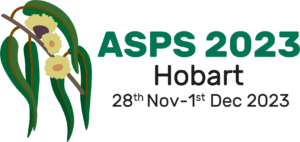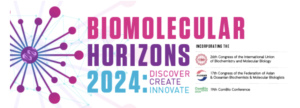- About
- Members
- Join
- Member log in
- Membership Renewal
- Member directory
- Life Members
- ASPS Life Member Professor Graham Farquhar
- ASPS Life Member Associate Professor Hendrik (Hank) Greenway
- ASPS Life Member Dr Marshall (Hal) D Hatch
- ASPS Life Member Dr Paul E Kriedmann
- ASPS Life Member Dr Mervyn Ludlow
- ASPS Life Member Emeritus Professor Rana Munns
- ASPS Life Member Conjoint Professor Christina E Offler
- ASPS Life Member Professor (Charles) Barry Osmond
- ASPS Life Member Emeritus Professor John W Patrick
- ASPS Life Member Dr Joe Wiskich
- Corresponding Members
- Elected Fellows
- Events
- Awards & Funding
- Employment
- Publications
- Research
- Teaching
- Menu
December Phyogen and deadline for International Botanical Congress symposium proposals
21 December 2022
Dear colleagues,
The December issue of Phytogen is out now and can be accessed HERE.
This is also a reminder that the deadline for submitting symposium proposals for the International Botanical Congress (IBC).
Two years ahead of the XX IBC, we are pleased to launch the Call for Symposia. We encourage researchers worldwide to submit symposium proposals on a variety of topics through the IBC website. The call for symposia will remain open until December 30th, 2022. Symposia constitute a very important component of the XX IBC, please submit a proposal and help shape the meeting’s program! Also note that diversity of speakers in terms of gender, career stage, and geography will be one of the criteria for selecting proposals. Symposium proposals that bridge two or more of the 31 proposed topics, including novel views and/or multi-disciplinary research perspectives, are especially encouraged.
Best regards,
The Organizing Committee of the XX IBC.
Call for symposia
Proposal submission now available! The scientific committee will evaluate symposium proposals based on potential audience interest, scientific quality, and diversity of speakers in terms of gender, career stage, and geography, among others. Symposium proposals that bridge two or more of the 31 proposed topics, including novel views and/or multi-disciplinary research perspectives are especially encouraged. We will make an effort to accept as many proposals as possible. Each symposium will last for 2 hours and will consist of six 20-minute oral communications (15 min presentations + 5 min Q&A). To maximize the interchangeability of participants among concurrent symposia, changes to this schedule will not be allowed. Deadline for symposium proposals 30 December 2022. Proposal Submission
Topics
|
1. Agroforestry Systems |
2. Bioinformatics |
3. Biogeography / Phylogeography |
|
4. Botanical History |
5. Bryology |
6. Comparative Genomics / Transcriptomics |
|
7. Conservation Biology |
8. Crops and Wild Relatives |
9. Development and Structure |
|
10. Ecology and Plant Communities |
11. Ecophysiology |
12. Education and Outreach |
|
13. Ethnobotany |
14. Floristics |
15. Functional Genetics |
|
16. Global Change Ecology |
17. Hybrids and Hybridization |
18. Mycology and Lichenology |
|
19. Macroevolution |
20. Paleobotany / Archaeobotany |
21. Phycology |
|
22. Phylogenetics and Phylogenomics |
23. Physiology |
24. Plant, Animal, and Microbe Interactions |
|
25. Plant Biotechnology |
26. Palynology |
27. Population Genetics |
|
28. Pteridology |
29. Restoration Ecology |
30. Reproductive Biology |
|
31. Systematics |
|
|
Prof Martha Ludwig (she/her)
Head of School
School of Molecular Sciences • +61 8 6488 3744 / +61 8 6488 4699
December 2022 Phytogen
16 December 2022
Welcome to Phytogen for December 2022
Below are reports from some of our award recipients in 2022. Over the summer break we hope you can recharge and be inspired to submit applications for when awards open in January 2023.
There is also … a save the date for ASPS 2023!!!
Please add yourself to our conference mailing list and help us during the planning stages by filling out our ASPS2023 EOI form: https://forms.gle/osUAvNEyn9jcwtw78
Please share widely with your colleagues and students.
Jan Anderson Award, Frances Sussmilch, University of Tasmania.
My research focusses on the similarities and differences that can be seen in the functions of related genes between diverse plant lineages. I began my research career investigating the genes that regulate flowering in garden pea (Pisum sativum) with Assoc. Prof. Jim Weller’s group at the University of Tasmania. My PhD research left me impressed by the impact that a single nucleotide change in a key gene can have on plant phenotype1, and how useful in-depth knowledge of gene function in one model plant species can be as a starting point for understanding the roles of related genes in other species. As an early postdoc, I worked across three different research groups using molecular biology to address quite disparate research questions relating to i) the genetic control of flowering time and inflorescence architecture in legumes, ii) the evolution of genes controlling stomatal closure in land plants with Asst. Prof. Scott McAdam and Prof. Tim Brodribb, and iii) the diversity of orchid mycorrhizal fungi in Australia with Dr Nigel Swarts. This gave me the opportunity to make valuable contributions to projects that I wouldn’t have initially thought were within my wheelhouse through collaboration with experts in these different fields. Highlights included characterising the genes affected in mutants that had been studied for decades, allowing this wealth of accumulated knowledge to be drawn together to better understand how the affected genes normally function in plant growth and development, including a pea flowering time/photoperiod response mutant2, a fern abscisic acid signalling/sex determination mutant3, and a pea auxin biosynthesis/leaf venation mutant4. Since then, I’ve enjoyed learning new techniques to investigate the evolutionary history of genes known to control angiosperm stomatal opening and closure and the functionality of related genes in diverse extant plant groups, including abscisic acid biosynthesis and signalling genes e.g. 5-8, and ion channels9, 10. I have been fortunate to have been supported by funding from the German Academic Exchange Service (DAAD) and Australian Research Council DECRA and Discovery schemes, and collaborating as an Associate Investigator within the ARC Centre of Excellence for Plant Success in Nature and Agriculture, enabling me to study fascinating aspects of plant biology and work with some great researchers in the process. It is an incredible honour to be recognised by ASPS with the 2022 Jan Anderson Award, and exciting to think about what discoveries in plant science may yet be to come.
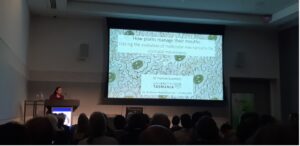
Jan Anderson Award Lecture at ComBio2022. Photo credit: Dr Akila Wijerathna-Yapa.
References
- F. C. Sussmilch et al., Plant Cell 27, 1046-1060 (2015).
- S. Ridge et al., Plant Cell 28, 2545-2559 (2016).
- S. McAdam et al., Proc. Natl. Acad. Sci. U. S. A. 113, 12862–12867 (2016).
- S. A. M. McAdam et al., Plant Physiol. 175, 351-360 (2017).
- S. A. M. McAdam, F. C. Sussmilch, T. J. Brodribb, Plant Cell Environ. 39, 485-491 (2016).
- F. C. Sussmilch, T. J. Brodribb, S. A. M. McAdam, J. Exp. Bot. 68, 2913-2918 (2017).
- F. C. Sussmilch et al., Trends Plant Sci. 24, 342-351 (2019).
- F.-P. Zhang et al., J. Exp. Bot. 69, 1261–1267 (2018).
- I. Dreyer et al., Trends Plant Sci. 26, 41-52 (2021).
- F. C. Sussmilch, M. R. G. Roelfsema, R. Hedrich, New Phytol. 222, 84-90 (2019).
Hank Greenway Award for Education and Outreach: Adelaide University National Science week team: Megan Shelden, Georgia Koerber, Beth Loveys.
Our team was honoured to be awarded the Education and Outreach Award for our delivery of a successful Science Week event in 2021. We presented the award lecture in the Education Symposium stream of the conference; our presentation was titled: Plant Science: Safeguarding our Future Food Security.
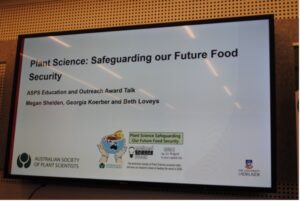 |
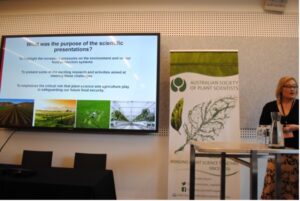 |
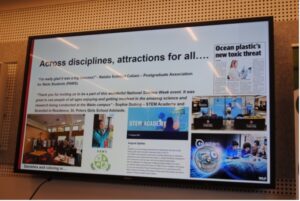 |
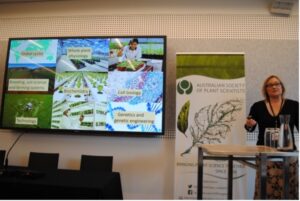 |
Photos of our award talk.
There was a full day of Education focused conference presentations from educators in fields of biochemistry, molecular biology, plant science, cell biology and genetics. It was great to see the fantastic approaches that people were taking to improve tertiary science education for students. Some of the highlights of the Education sessions are described below.
Dr. Saw Hoon from the University of Melbourne described a ground-breaking student-led journal and conference she developed. The journal was inspired by the wonderful essays written by her students as part of the assessment in her course. The essays were so good Saw wanted to give them another life so she decided to create a student-led, peer reviewed journal, “Humans 2.0”. To launch the journal Saw and her students organised a conference to showcase the student work. The student presentations were mixed with those by staff. More can be seen at https://biomedicalsciences.unimelb.edu.au/study/humans2.0
Dr. Anna Galea from UNSW described a student ambassadors’ program which started in biochemistry but is now university wide. Students self-nominate in each course and provide periodic feedback to course coordinators. Students run surveys of their peers, a check in survey early in semester. They also write their own revision questions. https://www.teaching.unsw.edu.au/about-teaching/students-as-partners/student-focus-groups
Dr. James Tsatsaronis from LaTrobe University teaches large classes (approx. 200) of level 2 biochemistry. To manage the class with limited staff he established a program called “Near Peer Mentors”. The near peer mentors were students who had taken the class in the previous year and achieved excellent grades. They allocated 3 small teams of students (5-6) in tutorials where students were working through PBL activities. The near peer mentors supported the junior students, guiding them through the activities that they had themselves done the previous year.
As the students were working in teams part of the assessment was a self and peer evaluation undertaken at the end of each tutorial session. The self and peer evaluation was worth 50% of the tutorial marks. Team structure was not fixed, students were able to select new team members each week (avoiding the problem of students being absent).
There was a student panel discussion where students gave their thoughts and perspectives about online learning during the pandemic. It was very encouraging to see students thriving and prioritizing their mental health.
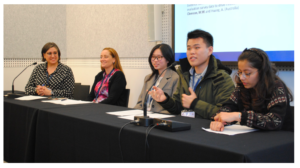
Student led panel discussion.
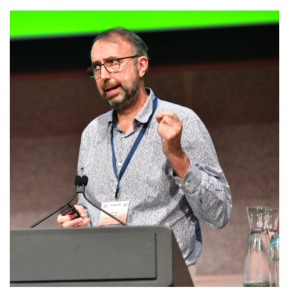
Plenary by Associate Professor Merlin Crosley.
It was fantastic to see an Education focused plenary in the ComBio program this year, Associate Professor Merlin Crosley (DVCA) from UNSW described the challenge of recognising excellence in teaching.
When student experience of learning and teaching at UNSW was analysed, it was apparent that teaching satisfaction scores were higher for Education Specialist staff than standard academics. Prompting the question why do students recognise and value excellence in teaching, but management do not? This observation led to the development of a teaching focused University College, called Scientia Education Academy. By a competitive process, academics were invited to apply for membership of Scientia Education Academy, 40 of the most outstanding educators were selected and celebrated. https://www.education.unsw.edu.au/teaching/scientia-education-academy
|
|
Happy Christmas everyone and have a restful New Year.
Please login and check your ASPS membership is up to date. Encourage your colleagues and students to join ASPS.Tweet to @asps_ozplants your news and upcoming events and follow to keep up to date.
Save the Date for ASPS2023!
15 December 2022
Save the Date for ASPS2023!
Get out your 2023 calendars – we are planning a four-day, in-person, plant science conference in Hobart from 28 Nov – 1 Dec 2023.
Please add yourself to our mailing list and help us during the planning stages by filling out our EOI form: https://forms.gle/osUAvNEyn9jcwtw78
We welcome you to circulate this widely among your networks.
Looking forward to seeing you there,
The ASPS 2023 Organising Committee
Recent Posts
Tags
Archives
- June 2025
- May 2025
- April 2025
- March 2025
- February 2025
- January 2025
- December 2024
- November 2024
- October 2024
- September 2024
- August 2024
- July 2024
- June 2024
- May 2024
- April 2024
- February 2024
- January 2024
- November 2023
- October 2023
- September 2023
- August 2023
- July 2023
- June 2023
- May 2023
- April 2023
- March 2023
- February 2023
- December 2022
- November 2022
- October 2022
- September 2022
- August 2022
- July 2022
- June 2022
- May 2022
- April 2022
- March 2022
- February 2022
- January 2022
- December 2021
- November 2021
- October 2021
- September 2021
- August 2021
- July 2021
- June 2021
- April 2021
- March 2021
- February 2021
- January 2021
- December 2020
- November 2020
- October 2020
- September 2020
- August 2020
- July 2020
- June 2020
- May 2020
- April 2020
- March 2020
- February 2020
- January 2020
- December 2019
- November 2019
- October 2019
- September 2019
- August 2019
- July 2019
- June 2019
- May 2019
- April 2019
- March 2019
- February 2019
- January 2019
- December 2018
- November 2018
- October 2018
- September 2018
- August 2018
- July 2018
- June 2018
- May 2018
- April 2018
- March 2018
- February 2018
- January 2018
- December 2017
- November 2017
- October 2017
- September 2017
- August 2017
- July 2017
- June 2017
- May 2017
- April 2017
- March 2017
- February 2017
- January 2017
- December 2016
- November 2016
- October 2016
- September 2016
- August 2016
- July 2016
- June 2016
- May 2016
- April 2016
- March 2016
- February 2016
- January 2016
- December 2015
- November 2015
- October 2015
- September 2015
- August 2015
- July 2015
- June 2015
- May 2015
- April 2015
- March 2015
- February 2015
- January 2015
- December 2014
- November 2014
- October 2014
- September 2014
- August 2014
- July 2014
- June 2014
Copyright 2017 Australian Society of Plant Scientists Disclaimer & Privacy
Website by Michael Major Media

